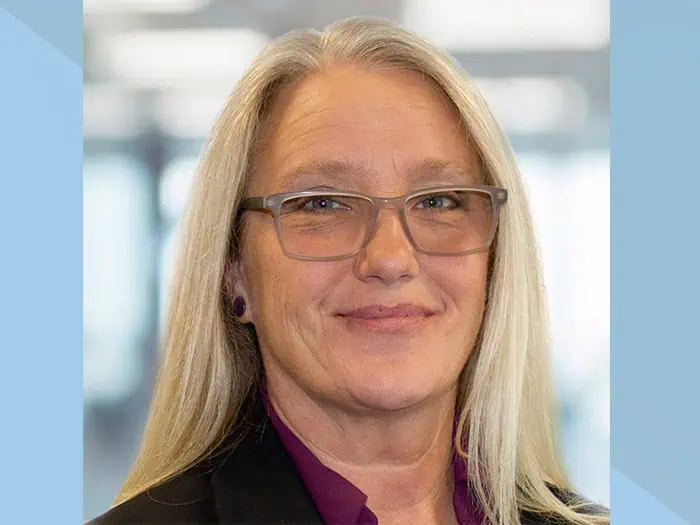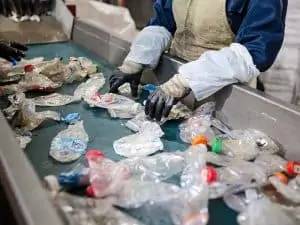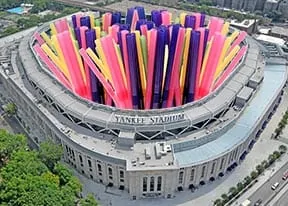


Sonya Betker is a zero waste and sustainability expert who brings decades of experience to SCS. Betker is a TRUE Advisor and a Sustainable Excellence Associate supporting her clients in sustainable resource management and waste reduction practices that minimize waste by reusing as many products as possible.
Betker’s expertise comes from leading regional, national, and global sustainability and circular economy programs for public and private clients by taking a holistic approach to lead and develop strategic programs. She is particularly proficient at maximizing partnerships for more efficient sustainability programs. Much of her experience has been in business management and brokering before her transition to environmental consulting.
Creating connections between stakeholders and excellent communication has been a constant throughout her career. These traits are especially valuable in zero waste and sustainability planning because they involve multiple stakeholders, including the public.
“Sonya brings field experience and a proven track record driving sustainability, building the business case highlighting potential revenue gains and cost savings with buy-in to sustainability,” states Betsy Powers, vice president and project director. “That provides more successful paths to circular systems, and our clients appreciate our sensitivity to costs.”
Betker’s background includes a B.S. in Business Management – Sustainability from the University of Wisconsin–Stout and over ten professional affiliations and certifications. She has a deep understanding of the most current sustainability issues, tools, and techniques and can communicate sustainability topics to diverse audiences. She can accurately assess sustainability risks and opportunities in an organization, community, or industry.
Betker is an author recognized in industry publications for her article “The future relationship of sustainability and traditional waste and recycling may be a key piece in solving our waste puzzle,” and featured in “Women in Waste” for her leadership skills.
“I’ve learned to look at the big picture of waste and recycling,” Betker said. “I like to look for commodities within markets and help with that circularity—reframing waste as a resource. Stopping or reusing food waste is a particularly rewarding area for many municipalities and businesses.”
Additional Resources:
SCS Engineers is a Silver Sponsor of the 2024 Wisconsin Integrated Resource Management Conference at the Chula Vista Resort in Wisconsin Dells, February 28-March 1.
WIRMC is a great local opportunity for continuing education and networking opportunities. The conference offers a great mix of technical discussion, emerging technologies, practices, and networking with other industry professionals, such as SCS Engineers (visit us at Booth 41).
AROW-Associated Recyclers of Wisconsin, SWANA-Solid Waste Association of North America, and WCSWMA-Wisconsin Counties Solid Waste Management Association jointly host the statewide conference.
Look for this highlight session featuring SCS Project Manager Chris Jimieson:

This session covers environmental equity, recovery of more recyclables, composting education and outreach, waste reduction/zero waste in recycling, and recycling education. Active participation and engagement in waste reduction efforts increase recycling. Three projects highlight the role of engaging education strategies, workshops, and community events in empowering Latinx, school, and neighborhood communities. Learn how the tools and behavioral communications strategies can be replicated in your waste reduction efforts, spreading the ripple effect of impact.
There’s plenty more on the Wisconsin Integrated Resource Management Conference agenda! Check here for the latest.
Florida SWANA will host its 2024 Winter Conference, “Together Towards Tomorrow”, February 19-21 at the new Drury Plaza Hotel Orlando in Lake Buena Vista, Florida.
Conference host is developing an interesting and educational agenda of sessions and speakers who will discuss the latest developments in the solid waste industry. This will be an excellent time to share with and learn from your peers. For industry suppliers and service providers, this is a great opportunity to showcase your company’s products and services.
This multi-day conference will include general sessions on best practices in the solid waste management profession, networking events and more.
The conference is targeted towards local, state and municipal government solid waste directors, managers, regulators, operators and coordinators; in addition to private sector consulting engineers and suppliers of materials and equipment used in the management of solid waste.
Topics may include:
Click for more conference details and registration information. Plenty of SCS Engineers professionals will be there – we hope you will too!
Join SCS Engineers professionals at the SWANA Florida chapter’s Summer Conference and Hinkley Center Research Forum, July 23-25 in Daytona Beach, FL.
Don’t miss this opportunity to network with some of the best minds in the solid waste industry at this important solid waste conference and tradeshow in the southeast, while earning continuing education hours and enjoying beautiful and exciting Daytona Beach.
The program committee is developing an interesting and educational agenda about the latest developments in the solid waste industry. The conference will explore important topics, such as solid waste management, rate analyses, recycling, zero waste, landfill design & operations, waste-to-energy conversion technologies, disaster debris management, and more!
Several SCS Engineers professionals are presenting at the conference, including
Click for more conference details and registration information.
We hope to see you there!
Today’s blog highlights successful K-12 recycling education programs in Wisconsin’s green schools that walk the walk in teaching kids and their parents important lessons about sustainability and the environment. Wisconsin’s Green Schools Webinar entitled “Re-imagine, Re-design & Re-cycle: School Waste Collection Systems That Work!” is taking advantage of the Carton Council funding to further zero waste in schools. The webinar is free to attend and open to everyone, with content designed specifically for K12 champions leading recycling programs for their school or district.
As schools set their sights on zero waste goals and seek to shift as much material from the trash to recycling and composting streams, they need an efficient material management system that is easy to use for students and staff alike and is sustainable to operate. Attendees of this webinar will hear directly from three different school districts about their recent innovations in bin design, construction, and placement.
The event includes students building receptacles and hallway recycling programs that are helping to maintain one district’s classroom eating program. The programs are re-imagining unique systems for collecting valuable items such as milk carton material.
Panelists include Brittney Albin, Sustainability Coordinator for Lincoln Public Schools; Chris Jimieson of SCS Engineers and a parent recycling advocate; and Madison Metropolitan School District’s Jeremy Drake, a Principal at Strategy Zero Waste Solutions.
Mar 22, 2023, 04:00 PM in Eastern Time (US and Canada)
The Carton Council will award $2,000 each to 25 communities that improve their resident education, with special attention paid to food and beverage cartons. Additionally, there will be first, second, and third-place prizes to recognize winners who provide outstanding communications and marketing efforts. 1st place will receive an additional $3,000, 2nd place an additional $2,000, and 3rd place an additional $1,000. More information about how communities can participate is here.
Recycling Tips and Resources for schools, parents, and municipalities:
Visit professionals from SCS Engineers and SCS Field Services at BOOTH 28 at SWANA’s 3-day Northwest Regional Symposium, April 18-20, at the Tulalip Resort Hotel in Marysville, WA. SCS Engineers and SCS Field Services are Bronze sponsors of the conference, and SCS Engineers is also a meal sponsor.
The symposium, themed “The Next Normal: The Future of Solid Waste Management,” will bring together solid waste industry professionals and students from a wide variety of specialized fields to exchange information and learn from technical experts. Hear presentations by SCS professionals, including:
The symposium program will include sessions on Organics Management Planning; Aging Transfer Facilities Planning; Waste Systems’ Financial Impacts (zero waste and funding opportunities); Emerging Landfill Industry Trends (PFAS, liner, leachate, and landfill gas); Sustainability, Recycling, and Extended Producer Responsibility (EPR). It will also include tours of several compelling sites, plenty of networking opportunities, educational credits, exhibits, and much more!
Each spring the Evergreen (WA and MT), Beaver (OR and ID), and Pacific (BC and Yukon) chapters of the Solid Waste Association of North America (SWANA) hold this joint Northwest Symposium.
For full program details and registration information, click here

Do you really need to use a drinking straw? With most beverages, probably not! Make this one change and help America reduce the amount of plastic going into our landfills.
Click to learn more about Sustainable Materials Management.
Many schools and school districts are prioritizing a shift toward zero waste and sustainability. However, learning to manage material resources on-site in a more sustainable manner presents operational and monetary challenges. Learn the benefits and steps to plan a financially sustainable program from Tracie Bills of SCS Engineers.
Tracie creates realistic approaches which allow for flexibility while maneuvering the unique challenges that occur. She takes you step-by-step through building a successful program and refers to established efforts such as in the City of San Jose that already have established zero waste programs in their schools.
Read the article by clicking here.
Setting up a school zero waste program takes time, patience, excellent collaboration and communication, and a team that wants to achieve the same goal of zero waste. Tracie Bills recommends a realistic approach in her article. She provides examples and describes how a consulting firms, such as SCS Engineers, assist schools without materials management programs to launch zero waste programs.
Building a successful program does not happen overnight, but you can do it!
Tracie Onstad Bills is SCS Engineers Northern California Director of Sustainable Materials Management. She has over 20 years of materials management experience, including working for a hauler, a county government, and a nonprofit, and over 12 years of experience with materials management consulting firms. She has provided commercial sector materials flow assessments; organics processing research and analysis; waste characterization studies; and recycling, organics, and waste management technical assistance to government agencies, schools, multi-family dwellings, and businesses. Ms. Bills has an environmental science degree from San Jose State and is an instructor for the SWANA Zero Waste certification program.
Hundreds of closed landfills in Wisconsin are required to perform groundwater monitoring and reporting. Typically, the frequency of monitoring, size of the monitoring well arrays, and the list of required parameters, was established many years ago as part of the landfill operating permit or closure plan approval. There is a potential to reduce, or terminate landfill monitoring when groundwater quality improvements are documented. WDNR guidance entitled “Reducing or Terminating Groundwater Monitoring at Solid Waste Landfills,” (PUB-WA 1013) provides instructions for requesting reductions to monitoring requirements.
Learn about new revisions to the WDNR guidance, developed with input from the WDNR’s Waste and Materials Management Study Group, which are intended to improve both the range of options for monitoring reductions and the process for requesting reductions. In addition to providing procedures for reduction in monitoring frequency, new revisions to the guidance include procedures for requesting reductions to the required number of monitoring wells and parameters. The revised guidance also provides instructions for communicating monitoring reduction requests to the WDNR review hydrogeologists.